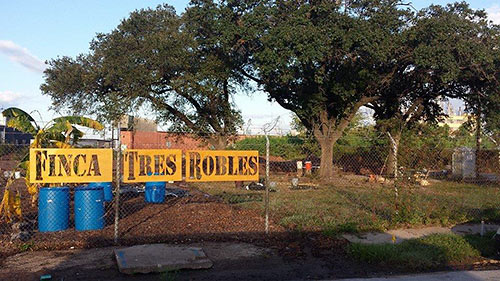
Two brothers who have opened a new agricultural venture in Houston’s East End are billing it as Houston’s “first private farm inside the 610 Loop.” Amid the gritty industrial wilds of N. Greenwood St. between Navigation and Canal — just a few blocks south of Buffalo Bayou’s Turkey Bend —Finca Tres Robles (spelled out and illustrated helpfully in the photo above) now sprouts on land owned by Electro-Coatings, a plating company. Other less bucolic neighbors, such as Baker Oil Tools and the US Zinc Houston Dust Plant, lurk nearby.
Until its 1996 purchase by Electro-Coatings (along with a warehouse owned by Sara Lee), the 1.2-acre plot now occupied by the farm served as a TxDOT service site. It lay vacant for the last 18 years. Beginning 6 or 7 months ago, the new proprietors jackhammered away the vestigial asphalt; they’ve since composted the lot and commenced agricultural operations.
Here’s the plan:
***
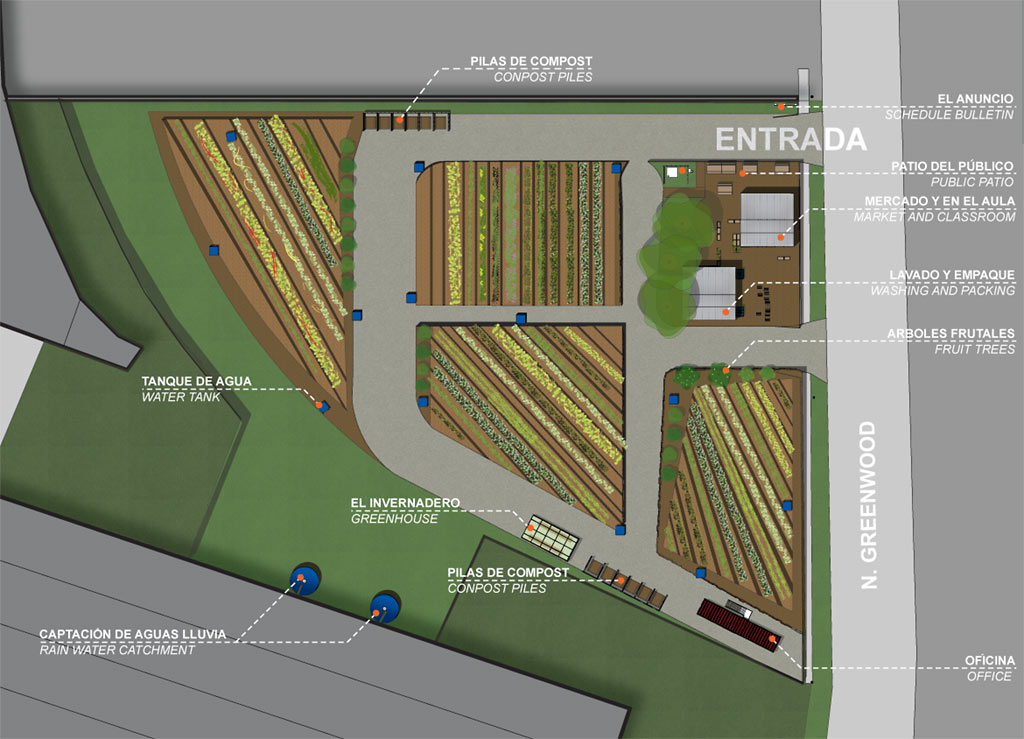
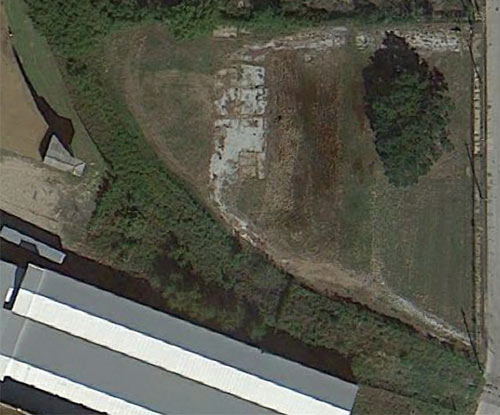
The farmers plan to grow organic herbs, fruits, and vegetables and sell them to individuals and restaurants on site and at area farmers markets. Here are some views of the property before its conversion:
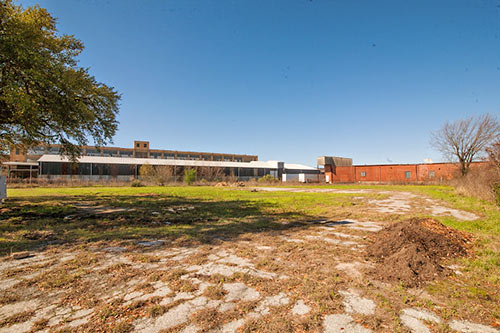
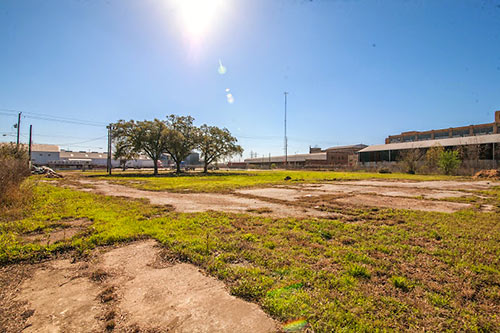
. . . and after:
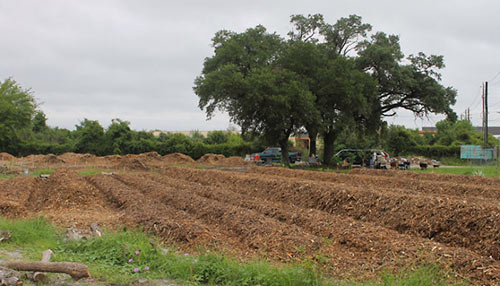
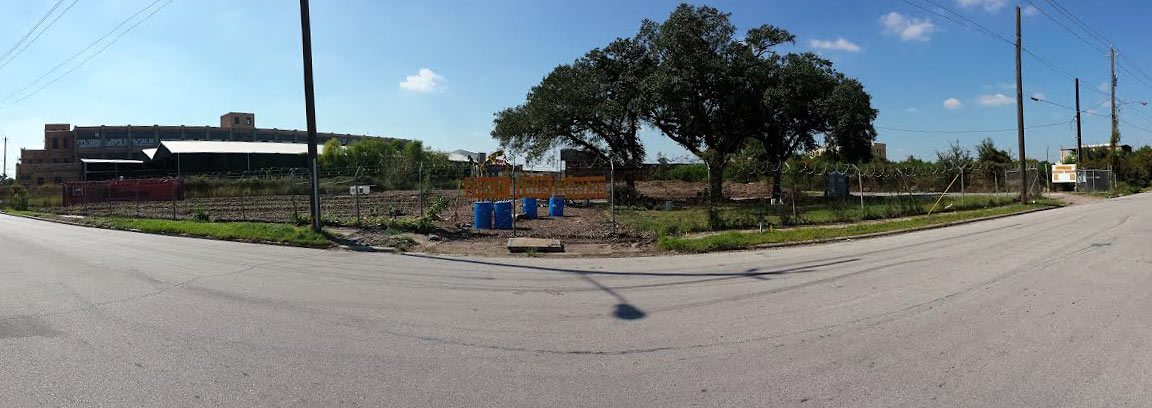
Residents of the 77011 zip code will be able to obtain sweat-equity memberships affording them half-price discounts on the farm’s beets, greens, parsley, sage, rosemary and thyme; the farm’s operators also intend to offer classes on “a wide variety of food and health related topics.â€
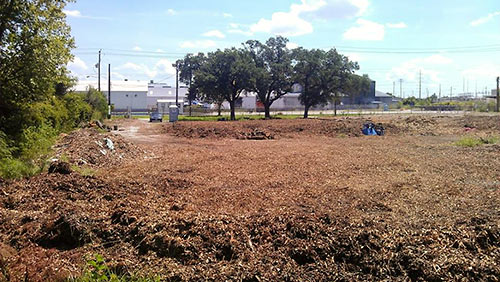
Finca Tres Robles is holding an “open farm day” this Saturday morning.
- Finca Tres Robles [Small Places]
Photos: Swamplot inbox Plan: Finca Tres Robles


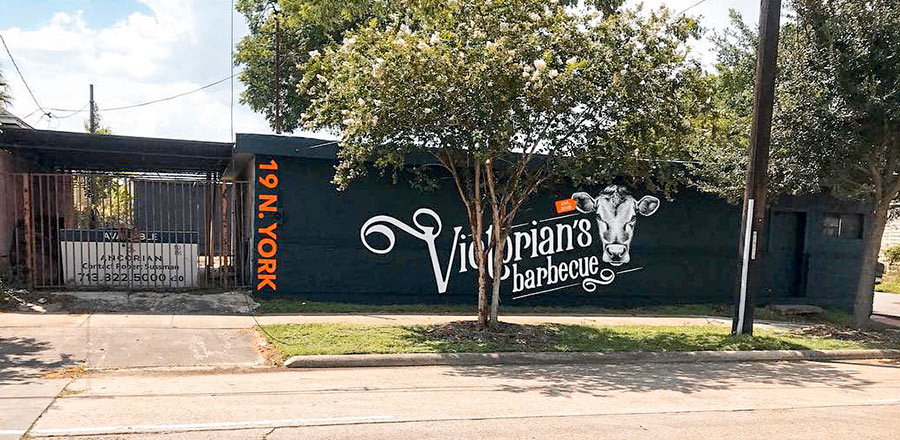

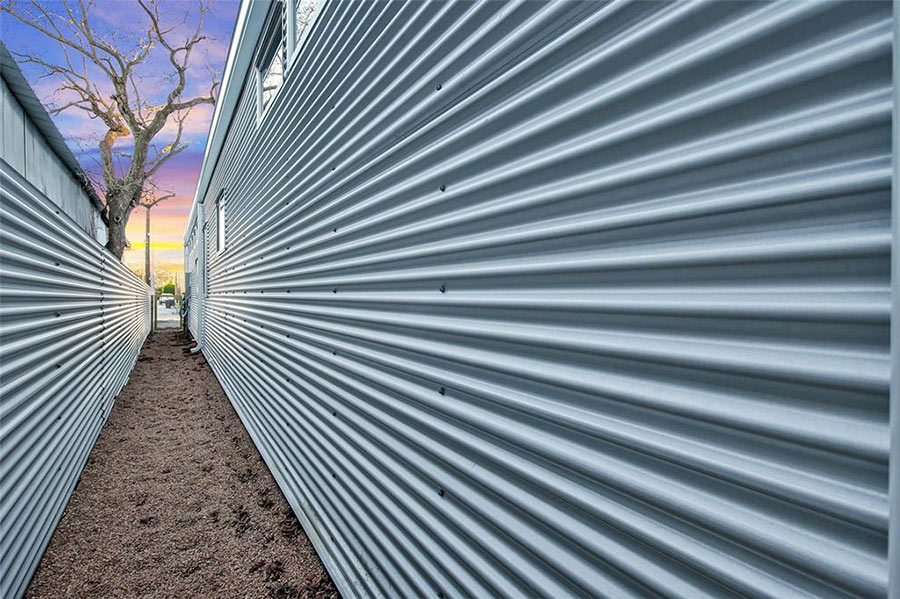
I would not put anything that grows on that plot in my mouth even if my life depended on it. Nevermind the decades and decades of contamination which I doubt they have the resources to properly mitigate, there’s still ongoing modern pollution wafting from surrounding industrial areas and the ship channel. This is example #2,457 of wild eyed hipsters with an idea they never think through to it’s end or any practical implications.
Given the previous industrial uses of the site, I’d be wary of growing anything intended for human consumption without first samping the soils or conductng a site assesment. It seems as if the venture is an unintended experiment in organic phytoremediation.
“First private farm inside the 610 loop”? I don’t think so. But commendable nonetheless. Good job guys!
Nice to see another one of these farms pop up on the East End, which is becoming the Breadbasket of the Bayou City.
I’m a little surprised they’re plowing up the soil that used to be a plating company and a TXDOT service facility though.
When the property was sold in 1996, there would have been an environmental assessment done. Typically, these sites are cleaned up when they are abandoned. Ones that are not because the company went bankrupt, or because they stayed in private ownership, typically get strong-armed by state and federal environmental rules. There is a good chance that this site was remediated a long time ago. The asphalt was probably poured over the newly placed, clean soil in 1996 when TX DOT started parking stuff there.
@commonsense: Ever been to a mega-farm in the Midwest, the TX Panhandle, or Bakersfield, CA? More chemicals and toxic substances will touch your food there than at this place.
The site and soil has been sampled and assessed for contaminants so I wouldnt jump to conclusions about it all. Common sense would tell us to not make statements before you actually know fully about the situation. You should meet the two brothers running the farm, they are really nice people and not wild eyed hipsters by any means.
Good point commonsense, I too wouldn’t feed you any of their food if your life depended on it.
*rimshot*
What’s Spanish for “Yummy Heavy Metals”?
I would imagine an environmental consultant would have been employed to collect samples for analysis. If all checked out, then there should be no harm. If all didn’t check out, then the soil would had have to be excavated.
Of course, this is pure speculation and I’m not sure if Houston’s do-whatever-you-feel policy mandates the said action. It is a simple matter of adding, though. Contaminated soil + customers + cancer = lawsuit.
Commonsense, we live in Houston. The nation sees this part of Texas as “cancer central”.
@Superdave, there’s a big difference between farming chemicals and pesticides (especially modern ones). They’re light years safer (despite popular hysteria) than they used to be and are generally accepted as safe by all major sciences. This site is surely contaminated by heavy metals, industrial solvents, all kinds of stuff nobody can pronounce that percolates up through deep soil and ground water. There are still regular releases of pollutants in the area, there’s reason cancer and other environmental cause diseases are much higher in that area. It would be safer to rinse your toothbrush in a public toilet than to eat a carrot from that lot.
1.2 Acres does not make a farm…more like a large garden….They can call it whatever they want, but a farm seems like quite a reach. I will be interested to see if they can make enough money to stay in operation on such a small tract….its going to have to be some kind of crazy “organic local” pricing to even come close to covering just its taxes.
P.S.
I’ve done environmental reports on RESIDENTIAL lots that will give you cancer just by reading them. It’s practically impossible to fully clean up a site once it’s been contaminated because of ground water movements and contamination creep from adjoining properties. There’s a big difference between cleaning up a property good enough to lay a concrete slab on vs. one you want to grow food on that absorbs everything from the immediate surroundings like a sponge.
This reminds me of the collective farming of communist russia. Only Hipsters and Obama voters would eat naturally grown food. I prefer my food the American way: Completely Synthetic and Manufactured, oh and full of freedom.
@Mark: any plot of land that you produce agricultural products for consumption on qualifies as a farm by standard definition of the US and Texas Departments of Agriculture.
.
I do find it rather ironic that just a short distance away, METRO refused to build an underpass for light rail due to what they complained was heavy soil contamination.
“This is example #2,457 of wild eyed hipsters with an idea they never think through to it’s end or any practical implications.”
+++
One of the owners has a Master’s in Engineering. What a hipster dufus! Try again, common.
These comments made me think are the liberal and conservative populations are accepting of science only when it fits their agenda. I’m making broad generalizations and there are obviously people on every side but stick with me. Conservatives don’t believe in the science of global warming but do believe in the science of healthy pesticides and GMO. While granola people are strong advocates of the science in global warming but not the scientists who tell us herbicides and pesticides are ok. (Full disclosure: I believe in global warming and the general safety of engineered foods but prefer to eat a natural and unprocessed diet. Which can include round-up ready corn and organic apples.)
Hey, hipsters can have advanced degrees, doesn’t make them any smarter in real life. A lot of engineers are good engineers but are as dumb as bag of rocks when it comes to running a business or make real world decisions.
You arrogant, nay-saying negative nancies will be on your knees begging for food from places like this if your domesticated depency on the grocery stores comes to a screeching halt one day. These folks are examples of how we can all become independent food producers and be a lot healthy for it. A 1/4 acre lot with a house on it can produce an enormous amount of food. Places like this can feed hundreds year round.
@Dana-X, under what circumstances would our dependence on grocery stores will come to an abrupt end? Nuclear war? Fall of western civilization? I think we’re ok on relying on the grocery stores for the time being.
This urban planting things is a mere hobby, not food production. It is incredibly inefficient as source of food, the yield per acre is minuscule. And more importantly it’s an incredibly inefficient use of one’s time, spend your time on creating progress, not reverting to subsistence farming of days of yore.
A few thoughts:
1) The two brothers involved are good humans – kind, compassionate and mindful; the type of people you want as friends and neighbors.
2). The soil has been tested in multiple capacities for heavy metals and all is well.
3) If still concerned, they are building “up” soil through wood chips and compost and essentially all food crops that are being grown are a good 2 to 3 feet above the original soil. Additionally, most vegetable roots do not penetrate deeper than 6″ – 24″ into the ground.
Lastly, I agree that it is wise to question and be concerned of environmental pollutants but to spew negative and judgemental thoughts about people who you do not know is a fine display of ignorance.
I have compassion for those folks though because to navigate this world wearing that filter is merely masking your own pain and suffering. And some may say that those who give the gift of negativity to this world are the true toxins in society. But I’m an optimist and maybe you just need a hug and some good loving.
@commonsense; yes, all of those situations you mentioned could happen, or even a dispution in transportation for a week or so would cause massive societal problems as 99% of this country is vulnerably dependent on stores for their food supply. And those who poo-poo that possibility would be in deep doo-doo if it were to happen. Anyway, the main reason these types of projects are becoming more popular is because more and more people want fresh foods. It would be hard to argue that produce grown in factory farms and shipped from across the country is better than something grown locally and organically. And I think you’ll be surprised at what types of yields are possible.
https://www.youtube.com/watch?v=NCmTJkZy0rM
And as for the idea of spending one’s time creating “progress”. Like what? Watching TV, working in an office, playing golf, building townhomes, accumulating money? Whatever…to each his own.
@Dana-X, it has been shown over and over again that in blind tests not even hard core foodies can tell professional farm grown food vs. local organic. It has also been shown numerous times scientifically that “organic” food has no nutritional advantages over commercial food. In fact, organic food has a higher rate of contamination including e-coli because of using natural fertilizers like sh*t.
On a personal note, I lived in a small farm town for a while and ate nothing but local food, and believe you me, just because it’s local does not mean it’s the best, certain foods grow and taste better in their unique places. There’s a reason people always strive to get the best food FROM THE PLACES WHERE THE FOOD GROWS BEST, peaches from Georgia, beef from Argentina, grapes from California, and so on.
Commonsense – “percolates up through deep soil and ground water”…not sure how many years you have been working in the Texas gulf coast as an environmental consultant, but the upward movement of contamination hasn’t really been something I have seen at least as you’ve described it.
The clays here, gumbo as we all know it, is nasty stuff and does hold contamination very well. But if you dig and haul it is actually pretty easy to put down clean soil that stays clean. Who knows what ultimate was done as a remedy at the site but I am sure that these guys have spent and will spend some money continuing to test their crops. Particularly if they are trying to be certified organic.
You are right though, dust and other airborne contamination migrating onto the plants and surface soil is a concern and something I would be taking seriously if I was them.
@MH005, an example would be the neighborhoods downstream (underground) from the Marqee entertainment center on I10 and Silber which used to be Cameron iron works in the 60’s. As recent as 2006 you could put a collection device INSIDE an older home (tent contraption with collectors) and have a measurable amount of chemicals coming up through soil and even the concrete slab… and I quote “equivalent to walking into a DryCleaning facility”. And that’s after decades of cleaning up the site and even pumping up ground water, filtering it, and pumping it back down.
There was a complete phase one done on the property and additional soil samples were sent out for metals and organics before a shovel was out in the ground. A lot of effort went into qualification of the property before the project began.
Common- So vapor intrusion, sure an issue in places. Not an issue with metals. Yes plating facilities have solvent issues, but I assume if things are that bad at this site they wouldn’t have moved forward with a farm onsite.
I don’t know if an APAR was done for the site, but TCEQ would have certainly paid attention if they had open pathways for workers via surface soils and vapor. Again, gross speculation on everyones part. I’m guessing the guys are not turn a blind eye to it all particularly as they are the ones digging in the dirt all the time.
“Places like this can feed hundreds year round.” LOL SMH
The only answer is a bioassay. Grow food on the plot, feed it to rats, check for tumors. Feed it to pregnant rats, look for birth defects (but don’t get comfortable with a negative result, e.g. thalidomide). Test for mutagens using an Ames test, or look for SOS responses (or the equivalent). Chemical analysis will not detect anything you are not looking for, or gets bioconverted in the soil to something even worse.
If Houston hadn’t been so hard-headed about having chickens in the city limits, they could have an enclosed chicken yard, too. Fresh eggs are so much more flavorful than the factory produced ones. Mine love it when I give them weeds and vegetable scraps. Makes the egg yolks even richer. And as a Texan, I prefer to support our own Texas beef producers than eat imported Argentinian beef. And peaches from Pittsburg, Fredericksburg or Fairfield, Texas. Farmers Markets, pick-your-own, and farmer co-ops are growing in popularity every day. I know of a farm that makes goat cheese that had to limit the markets they go to, as they would sell out too soon, and not have enough for regular customers and the restaurant they sell to which has specific dishes highlighting their wonderful cheeses.
These guys may call it a farm, and meet that USDA definition, but it won’t meet that for property tax purposes. Will still pay taxes as commercial property. That can be steep.